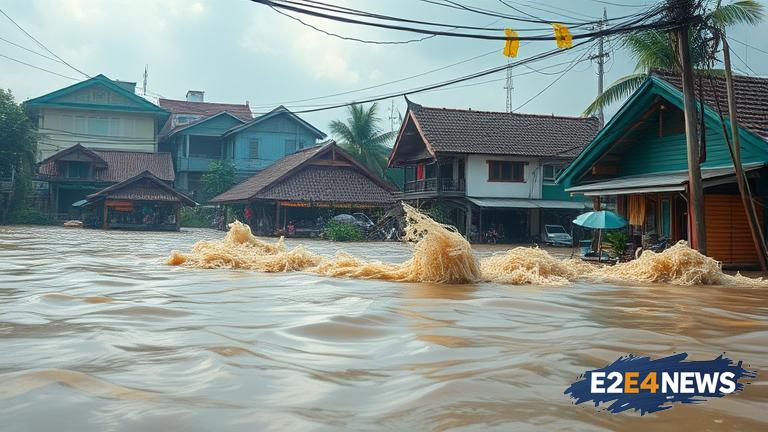A severe storm warning has been issued for several provinces in northern Thailand as tropical storm Kajiki made landfall, bringing with it heavy rainfall and flash flooding. The city of Chiang Mai has been particularly affected, with many roads and streets becoming inundated with water. The storm, which is expected to move westward into Myanmar, has already caused significant disruptions to daily life in the region. Residents have been advised to stay indoors and avoid traveling unless absolutely necessary. The Thai Meteorological Department has warned of heavy rainfall and strong winds, with gusts reaching up to 40 km/h. The storm is expected to bring rainfall of up to 200 mm in some areas, leading to flash flooding and landslides. The authorities have set up emergency shelters and relief centers to assist those affected by the storm. The Chiang Mai provincial government has also announced plans to distribute food and water to affected residents. The storm has already caused significant damage to infrastructure, with reports of downed power lines and blocked roads. The Thai military has been deployed to assist with relief efforts, including evacuating residents from flooded areas. The government has also warned of the risk of waterborne diseases, such as cholera and typhoid fever, due to the flooding. Residents have been advised to take precautions, including boiling water before drinking and avoiding contact with floodwater. The storm has also affected agriculture in the region, with reports of damaged crops and livestock. The Thai government has announced plans to provide financial assistance to affected farmers. The tourism industry has also been impacted, with many hotels and resorts reporting cancellations and reduced bookings. The storm has highlighted the need for improved flood mitigation measures in the region, including better drainage systems and early warning systems. The Thai government has announced plans to invest in flood prevention measures, including the construction of new dams and levees. The storm has also raised concerns about the impact of climate change on extreme weather events in the region. The Thai government has pledged to take steps to reduce the country’s carbon footprint and mitigate the effects of climate change. In the meantime, residents are bracing themselves for the aftermath of the storm, with many expecting a long and difficult recovery process. The international community has offered support and assistance to Thailand, with many countries pledging aid and relief supplies. The storm has also highlighted the importance of regional cooperation and disaster preparedness, with many countries in the region sharing expertise and resources to respond to the crisis.
